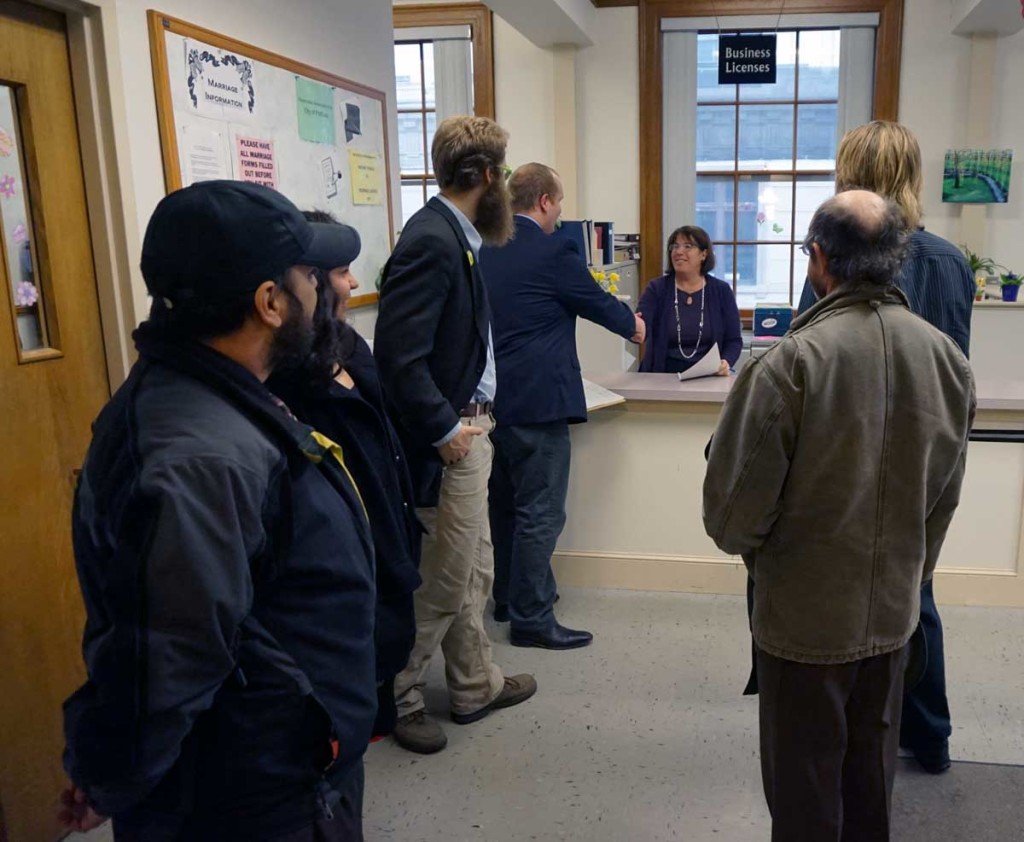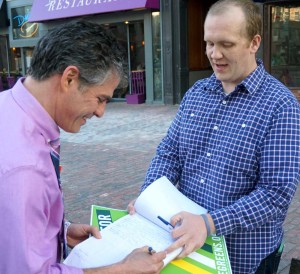So you want to put your own ordinance on the ballot? Get ready… The process is not exactly an easy one. Plus, City Hall does not have an interest in making the process any less difficult for you.
“Any ten citizens are able to join together, write an ordinance, and take it to the ballot,” says Tom MacMillan, who as Chair of the Portland Green Independent party has participated in many ballot initiative efforts–both successful and not successful.
But it is not as easy as that, Tom.
The first step is drafting the ordinance. This requires a certain level of knowledge that few have. There are not even that many lawyers who have enough knowledge of municipal law — let alone Maine municipal law — to effectively draft an ordinance.
You may work with the City’s attorney, the Corporation Counsel, to draft the ordinance, but depending on who the attorney is and what the issue is, it is hard to say how eager they will be to work with you.
An example of this reluctance occurred in 2011, when Sensible Portland was seeking to make marijuana laws the lowest enforcement priority for the police. Then Corporation Counsel, Gary Wood, was reluctant to even meet with Sensible Portland.
Gary Wood was aghast at the concept of lowest priority for marijuana laws, stating, “What if you wanted to make murder legal?” Clearly, the voters of Portland would not vote to make murder legal. They did however vote to make marijuana legal a couple years later, in 2013, a year after Gary Wood’s retirement.
“It’s pretty clear that City Council doesn’t like the referendum process– City Hall doesn’t like it,” Tom MacMillan explains from his experience.
Once the ordinance is written, a petition committee of at least 10 registered voters in Portland submits it along with their signatures, in a particular form of an affidavit, to the City Clerk. The affidavit form is described in City Code.

Tom Macmillan shakes hands with Clerk Kathy Jones, as 10 citizens turn in their affidavit for a $15 minimum wage ordinance in March.
The Clerk’s office has seven calendar days to provide the petitions, but the Clerk might not provide the petitions. They wait for approval from the Corporate Counsel. They may decide that your ordinance is not an appropriate initiative–one that deals with legislative matters, and not administrative or budgetary. That is correct, you cannot submit a ballot initiative to re-write the budget. Sorry.
This was a roadblock that the Protect Our Parks group ran into in 2014, when they were collecting signatures for the parks initiative to stop Congress Square Park, and other potential parks, from being sold. The City claimed that the sale of a park is an administrative decision. The petitioners had to sue the City to get petitions.
“We essentially broadened the definition of what the referendum can be used for in Portland,” said David LaCasse, who was deeply involved with the Protect Our Parks initiative. Their court case helped to define more clearly what is legislative and what is administrative.
Once petitions are delivered from the Clerk the hard part begins. The petition committee has 80 days to collect 1500 valid signatures from registered voters.
This is harder than it might sound. First off, the petitions must officially be embossed by the City Clerk. Petitions cannot be photocopied, so be careful about how many you hand out to your volunteers–who by the way must be registered voters in Portland.
Let us assume you are organized enough, and the issue is popular enough, that you get 1500 signatures. Do not stop now! Despite what all those people said, at least a quarter of them are not actually registered voters. So keep going…
You better turn in a sizable margin of extra signatures. The current norm seems to be about 3000.
You only get one chance to turn in the signatures, which is a much more arduous process than collecting for a state petition–where a rolling turn-in is allowed. You only get one chance to get it right, and the Clerk will toss out signatures for any number of reasons: not an eligible voter, illegible signature, not the same signature as what they have on file, wrong name due to name change conflicting with what is on the voter registration card…
Within 15 calendar days the Clerk must finish validating the signatures and certify the petition. Usual it does not take that long, but the Clerk’s office has that much time if needed. Clearly, they are not likely to be happy with the extra work, but they will do their best to get it done in a timely manner.
If you have been successful, the next step is in the hands of City Council. At their next regularly scheduled meeting they set a date for a public hearing, which must be within 30 calendar days.
At the first regular meeting after the public hearing, the City Council chooses to either pass the ordinance without the need for a referendum, or they put it on the ballot at the next regular federal, state or municipal election which is not less than 90 calendar days after.
Timing is important here, strategically speaking. The time of year that you circulate and turn in signatures will determine when the initiative hits the ballot– the June primary, the November general, or a costly special election.
So you’ve done it. The ordinance, that you managed to draft and collect 1500 valid signatures for, is now on the ballot. Now the fun part begins… Campaign to win a yes vote! Should be easy, right?






